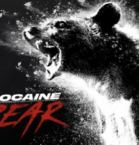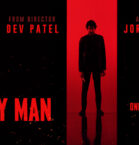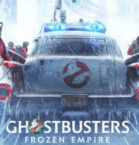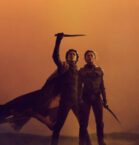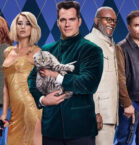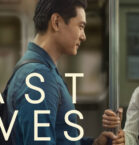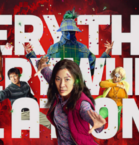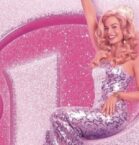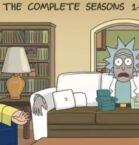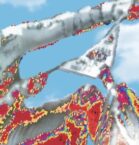Ugetsu Criterion Collection Blu-ray Review
It is 16th-century Japan, a time of civil war. Attacks on small villages are unpredictable and inevitable. In one such village lives a small group of families, similar to those in neighboring ones.
One head of household is Genjurō (Masayuki Mori, 1951’s THE IDIOT), a potter who makes his living selling his works. He is warned about greed during such times by his wife, Miyagi (frequent Kenji Mizoguchi star Kinuyo Tanaka), but finds no issue, saying, “War is good for business.” His neighbor, Tōbei (Eitaro Ozawa, 1952’s LIGHTNING), meanwhile, wishes to become a prominent samurai, although he is stomped by actual warriors, who view him as nothing more than a beggar. His wife, Ohama (Mitsuko Mito, 1952’s AVALANCHE), too, likens him to a village idiot.

After their homes are targeted, Genjurō and Tōbei decide to head across the lake in hopes of gathering any money they can. After coming across an ominous man who suddenly dies before them, the men send their wives back to shore so they can be safe as they continue their mission.
Little of this sounds like it would be a ghost story, and yet UGETSU (or, UGETSU MONOGATARI) partly is. Adapted from two of author Ueda Akinari’s short stories (“The House in the Thicket” and “The Lust of the White Serpent”) and one of Guy de Maupassant’s (“How He Got the Legion of Honor”), UGETSU is directly linked to supernatural tales from the 18th century. Still, to stamp it solely as a supernatural ghost story would be unfair. UGETSU is a multifaceted film which uses these aforementioned elements to approach and analyze issues of class, gender and war. It is as much a drama as it is a fantasy.

The desires for success and to achieve are heavy throughout the film. (As one character notes early on, “How high can a man rise without big dreams?”) With this come the conflicts between man and woman, particularly the men’s goals versus the women’s logic. It is the wives who justly acknowledge that any journey the men take can only offer danger and unfulfilling outcomes. Consider, too, the mysterious character of Lady Wakasa (Machiko Kyō, Akira Kurosawa’s RASHOMON), who easily seduces Genjurō and lures him to an estate.

UGETSU is directed by Kenji Mizoguchi, a master storyteller whose most notable works include 1939’s THE STORY OF THE LAST CHRYSANTHEMUM, 1952’s THE LIFE OF OHARU and 1954’s SANSHO THE BAILIFF. But UGETSU may be his finest achievement. It is a tale of desire and caution, of greed and blindness, told through a careful and observant eye, one that captures the desperation and ambition of a certain time and people.

Of note, too, are the terrific and often subtle performances, detailed Oscar-nominated costumes and remarkable cinematography, which delicately and artfully takes the film and its viewers along a route that intentionally resembles a traditional Japanese scroll.
BLU-RAY REVIEW
Video: 1.37:1 in 1080p with MPEG-4 AVC codec. “Supervised by Masahiro Miyajima and Martin Scorsese, this new 4K digital restoration was undertaken from a 35 mm fine-grain positive and a 35 mm duplicate negative at Cineric Inc. by The Film Foundation and Kadokawa Corporation, with funding from the Hollywood Foreign Press Association.”
UGETSU looks absolutely stunning in this high-definition transfer, which boasts a healthy image throughout that presents excellent details and strong contrast while still preserving the filmic quality that fans will appreciate. This is the finest UGETSU has looked on home video.
Audio: Japanese Mono. Subtitles in English. “The original monaural soundtrack was remastered from a 35 mm optical soundtrack print and restored by Audio Mechanics in Burbank, California.”
The audio transfer is also clean and has no issues of interferences.
Audio commentary by critic, filmmaker and festival programmer Tony Rayns: Rayns offers a wonderful commentary that is simultaneously professional and fascinating, as he looks at director Kenji Mizoguchi’s career, the film’s art direction, the source material, the supernatural elements and much more.
Interviews: There are three interviews here: a 2005 one with PALE FLOWER and DOUBLE SUICIDE director Masahiro Shinoda (14:09), who discusses the style of UGETSU; a 2005 one with first assistant director Tokuzo Tanaka (20:13), who reflects on collaborating with director Mizoguchi; and a 1992 one with cinematographer Kazuo Miyagawa (10:32), who shot UGETSU.
Kenji Mizoguchi: The Life of a Film Director (2:29:54): This 1975 documentary extensively covers the life and career of Mizoguchi. This is a remarkable doc that stands as one of the finest portraits of a filmmaker ever made. Essential viewing for fans of Mizoguchi and Japanese cinema.
Japanese Trailer
Spanish Trailer (incomplete)
Also included with this Criterion Collection release is a book featuring an essay by film critic Phillip Lopate and three short stories that inspired the film.

 Mathew Plale
Mathew Plale


